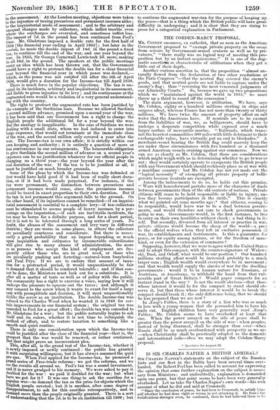THE COBDEN-MARCY PROPOSAL.
Mn. COBDEN enounees, ex cathedra, that as soon as the American- Government proposed to "exempt. private property on the ocean from seizure by Government-armed cruisers as well as. by pri- vateers, "there really was no logical way of meeting this pro- position but by an instant acquiescence." It is one of the dog- matin assertidins se characteristic of utilitarians when they get a little out of their depth. • Another. curious assertion is, that the proposition "almost an- turally flowed from the declaration of two other resolutions at the Paris Congress "—that the neutral flag covered the: enemy's goods, and that neutral goods are not liable to capture under the enemy's flag ; thus "reversing the most venerated judgments of our Admiralty Courts." So, because we gave up two propositions which we "maintained. against the world in 1815," we must throw- up a third to round off the concession !
The main argument, however, is utilitarian. We have, says Mr. Cobden, eighty or a hundred millions sterling in ships and cargoes afloat, whereas France has not more than twenty or thirty millions. We have twice the amount of property afloat on salt water that the Americans have. If neutrals are to be exempt from the liabilities of war, we, as belligerents, should have to. undergo a desperate competition while exposed over a mach larger surface of mercantile marine. "Railroads, which trans- mit the heaviest commodities 500 miles with little detriment to their exchangeable value, have virtually put an end to blockades." A merchant-vessel bearing the British flag could scarcely keep the sea under these circumstances with five hundred or a thousand armed. American vessels cruising against'our commerce-. Now we can see as clearly as Mr. Cobden, that these are considerations , which might weigh with us in determining whether to go to war or not ; they certainly operate to exasperate the British people with any Government which should recklessly place us at war with a maritime country : but Mr. Cobden has not yet made out the "logical necessity" of exempting all private property of belli- gerents because neutrals are exempted.
Among the inducements to do so, he holds out this promise. "Wars will henceforward partake more of the character-of duels between governments than of the old contests of nations-. Private citizens will cease to be held responsible or liable to injury, un- less they become participators in the strife." This is exactly what we pointed out some months ago ;* that citizens, ceasing to . be responsible, would leave war to be a duel between govern- ments, and would therefore not care to check governments in going to war. Governments would, in the first instance; be free to carry on their own hostilities without check; a bad thing in it- self. But secondly, divorced from all interest or practice in war, private citizens would become the sheep of the world—a prey to the official wolves whom they left in exclusive possession of war, its establishments and instruments. Is this a guarantee for peace, or for equity among nations, or for the freedom of man-- kind, or even for the extension of commerce ?
Supposing, however, that we were to agree with the United States: and to adopt this compact, with the counter-signature of Walew- . ski Bite!, and Orloff, what would be our position ? Our hundred
1 millions sterling afloat would be increased probably to a much larger sum ; English wealth would everywhere be in movement ; and that wealth would supply the sinews of war for the duelling governments : would it be in human nature for Russians, or Austrians' or. Americans, to withhold the hand from that vul- nerable part of Great Britain ? Would paper compacts for an instant stand in the way ? Is not the result obvious—that those a whose interest it would be for the compact to stand should oh- serve it, but that those whose interest it would be to break the compact should break it ; the only difference being, that we should be less prepared than we are now ? In lEsop's Fables, there is a story of a lion who was so much in love with a young woman that she persuaded him to have his nails cut. English children have very generally read 2Esop's Fables ; Mr. Cobden seems to have overlooked at least that one. When the power arrayed on the side of peace shall be greater than the power arrayed on the side of war—when peoples, instead. of being disarmed, shall be stronger than ever—when Russia shall be as much overburdened with prosperity as we are —when Christianity shall be practically adopted as the domestic and international code—then we may adopt the Cobden-Marcy proposal.


























 Previous page
Previous page